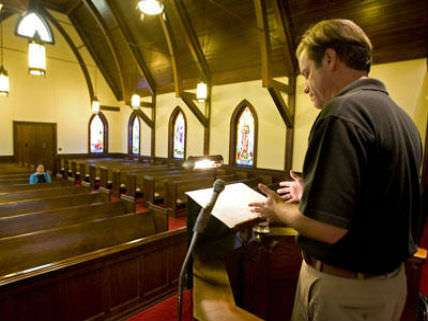Fewer Christians in the United States: Fourth Great Awakening Over
Just as I predicted seven years ago

A new poll by Pew Research finds that the number of Americans who declare that they are not affiliated with any religion has been increasing dramatically in recent years. This trend toward increased unbelief among Americans is just what I predicted in my 2008 article, "The New Age of Reason: Is the Fourth Great Awakening Finally Coming to a Close?" In the article I explained:
American society periodically weathers decades-long storms of moral renovation set off by thunderclaps of Christian evangelism. Old spiritual and moral doctrines get reinterpreted in a new light, producing far-ranging, and not always welcome, political change. Scholars commonly refer to these tumultuous periods as "Great Awakenings."
I argued that the Fourth Great Awakening had started up in the 1970s with the politicization and rise of the religious right. I then suggested that that wave of religious fervor was cresting and that we could look forward to a new era of greater tolerance. I was right.
As the New York Times reports today:
Seventy-one percent of American adults were Christian in 2014, the lowest estimate from any sizable survey to date, and a decline of 5 million adults and 8 percentage points since a similar Pew survey in 2007.
The Christian share of the population has been declining for decades, but the pace rivals or even exceeds that of the country's most significant demographic trends, like the growing Hispanic population. It is not confined to the coasts, the cities, the young or the other liberal and more secular groups where one might expect it, either. …
Over all, the religiously unaffiliated number 56 million and represent 23 percent of adults, up from 36 million and 16 percent in 2007, Pew estimates. Nearly half of the growth was from atheists and agnostics, whose tallies nearly doubled to 7 percent of adults. The remainder of the unaffiliated, those who describe themselves as having "no particular religion," were less likely to say that religion was an important part of their lives than eight years ago.
The ranks of the unaffiliated have been bolstered by former Christians. Nearly a quarter of people who were raised as Christian have left the group, and ex-Christians now represent 19 percent of adults.
As evidence that the Fourth Awakening was receding, I cited data indicating that Americans were rapidly becoming more tolerant of gays and lesbians, were increasingly against the Drug War, and much less hostile toward pornography, among other trends. All of which have become stronger since my article.
I concluded:
In 1908 Clarence Darrow told the Personal Liberty League, "The world is suffering more today from the good people who want to mind other men's business than it is from the bad people who are willing to let everybody look after their own individual affairs." That has been true for a long time now, but we may finally be heading toward a better world—one where Americans are increasingly willing to live and let live.
Hooray for the end of the Fourth Great Awakening!
Disclosure: I have been an out-atheist since I was a young teenager.


Show Comments (454)